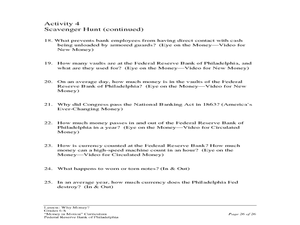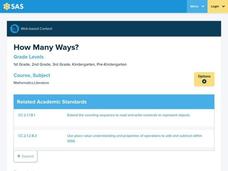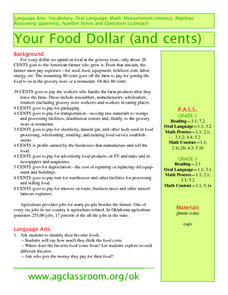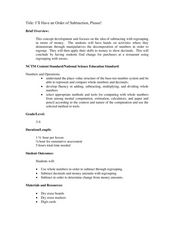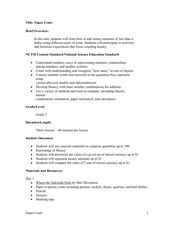Curated OER
Why Money?
Students participate in a trading simulation to learn about barter and the benefits of using money. In this barter lesson, students participate in a trading simulation and learn about coincidence of wants. Students then use money cards...
Curated OER
Count Coins and Bills
Learners study the names and values of different denominations of paper money, count sets of money that include both coins and bills. They complete a money chart, read and solve word problems.
Pennsylvania Department of Education
How Many Ways?
Students estimate the amount of money they have in groups of pennies, nickels, and dimes. In this money lesson plan, students then count up the amounts they have and exchange money amounts.
Curated OER
Comparing and Ordering Greater Numbers
Students line up the digits of the numbers they are comparing in the correct manner. In this comparing numbers instructional activity, students learn to line numbers up correctly on a place value chart before comparing them. Students...
Curated OER
Your Food Dollar (and Cents)
Young scholars examine where their food dollars go while recognizing coins and making change. They identify their favorite foods, receive one dollar, and take away amounts for each person involved in the production of their food dollar.
Curated OER
Ponzi? An April Fool's Day History and Economics Lesson Plan
Students explore the concept of a Ponzi Scheme. In this economics lesson, students invest in a product called Thin-Cups. Students invest money in this product over the course of a couple weeks. Students discover how a Ponzi Scheme works...
Visa
A Way to Wealth: Understanding Interest and Investments
Money motivates! Help young bankers understand how math plays a part in investing. Give learners math practice while instilling real-world financial literacy skills.
Curated OER
Money Makes the World Go 'Round
Students examine what a basic unit of currency means and how it affects world finances.
Curated OER
One Vs. One Hundred
Students explore the concept of place value. They differentiate between digits and their values as it related to addition and subtraction. Through the use of technology and manipulatives students investigate the place value of digits by...
Curated OER
Adding Pennies, Nickels and Dimes
Students add pennies, nickels and dimes and organize the coins to display a variety of price values from real life examples. They discuss the importance of money in the day-to-day world.
Curated OER
Saving Makes Cents
Students identify ways families save money. In this financial lesson, students read the book A Chair for My Mother and discuss ways to save money. Students identify coin values and practice counting money.
Curated OER
I'll Have an Order of Subtraction Please!
Students explore number values by completing consumer math worksheets. In this math functions lesson, students identify the use of a decimal in numbers and the place values that are represented when dealing with money. Students complete...
Curated OER
Riddle Me Cents!
Students use their creativity and logic skills as well as their knowledge of coin values and history to solve a variety of riddles. The lesson plan prompts students to compose their own riddles, exchange them with classmates, and solve...
Curated OER
Two of Everything
Students listen to story Two of Everything, illustrate coins they would put into the Magic Pot using paper and pencil, and solve Magic Pot riddles by viewing slide show and predicting coin totals. Students then create table listing...
Curated OER
Get Ready, Get Set, Squeeze!
Learners explore coin value and count coin combinations. In this money counting and social studies lesson, students read The Coin Counting Book by Rozanne Lanczak Williams and practice counting money and making change for a lemonade...
Curated OER
Super Cents
Second graders study money amounts less than a dollar. In this math lesson, 2nd graders practice counting coins. Students read various stories and discuss how money was used in the stories.
Curated OER
Trading Faces
Students use addition to determine values of coin combinations. They play a game where they come up with possible trades: two nickels for a dime and complete a tally worksheet. There are other lessons in this unit.
Alabama Learning Exchange
Pizza! Pizza! Pizza!
Fifth graders practice using money in everyday situations. They use their addition and subtraction skills as they work in cooperative groups to solve problems involving decimals.
Alabama Learning Exchange
Pat Brisson's Benny's Pennies
Learners listen to the book, "Benny's Pennies" and conduct math and language arts lessons to go along with the book. They demonstrate their ability to count pennies, understand proper sequence, and rewrite a story using different...
Curated OER
Beyond the Checkbook: Choices of Payment Methods
Young scholars explore different payment methods. In this math lesson, students discuss the difference between writing a check and paying online. They will compare and contrast and present their data to the class.
Curated OER
In the Bag!
Students calculate how many quarters are in a $1,000 bag (after learning the dollar value of filled coin bags). They explain their problem-solving strategy using pictures, numbers, equations, and/or words.
Curated OER
Made Round To Go Round
In this lesson young scholars investigate what it would cost to furnish one room of their choice by shopping on the Internet. Both Australian and American dollars are to be given for each item to demonstrate the difference between two...
Curated OER
Economy Introduction: Jack and the Bank Stock
Third graders explore the functions of money. In this economics lesson, 3rd graders read Jack and the Beanstalk to discover the three main functions of money.
Curated OER
KINDNESS
Students ponder about the importance of kindness to each other and how that value affects others as well as the community to which they live in. They brainstorm and discuss the meaning of a rhyme adapted from John Bunyan as well.


